 June 30, 2011
June 30, 2011
In Scotland the Torness nuclear generating units have been shut down until at least July 5 to clean out jellyfish clogging the intake filters for cooling water. In France, as in the summer of 2009, unofficial channels report that nuke generators are going through rolling shutdowns because a draught is drying up cooling water from rivers. And in the United States two nuclear plants are surrounded by water from flooding of the Missouri River, with some seepage entering parts of the Ft. Calhoun Plant. Nothing like the Fukushima disaster seems immanent, but idled plants are not generating juice either.
So why are generating plants affected by draughts and floods? All of them, whatever the fuel, lose 50% or more of their energy as waste heat that takes major league cooling to dissipate. Water being the most convenient coolant, generating plants are located near water – rivers or the ocean, usually. Some plants use water for evaporative cooling towers; others simply transfer the heat to water and discharge it back into rivers or oceans. Downstream from a plant, the temperature of river water may rise by 1-3 degrees F, enough to alter the life in the river.
Consequently many generating plants are located just above the all-time high-water mark of an adjacent source of cooling water. The higher it is above the water, the further coolant must be pumped uphill – another energy loss. And if the flow in a river drops so low that heated water would start killing off river life, the plant has to shut down.
Nuke plants are getting a lot of attention for safety reasons. However, using any fuel, a big electrical generating plant needs a lot of cooling capacity if 50% or more of the energy is waste heat, which makes water capacity and water cycles significant issues for them. Gas fired plants have higher thermal efficiency; that’s one reason why they are attractive. A plant ideal for thermal efficiency has a high operating temperature and very cold coolant.
Population and agriculture already put high demands on water supply in the same areas where we want more juice, and locating new plants using present technology on tapped-out rivers does not seem wise. For example, the European Environmental Agency estimates that 30-35% of abstracted water in Europe is now used to produce energy on a continent facing increased water shortages.
Doubling or quadrupling electrical generation capacity using high heat waste technology is unlikely. If we are technically smart, we will find more ways to use waste heat. If we are socially smart, we will reduce electrical usage while continuing to have a high quality of life. But can we make ourselves that smart, and if so, how?
